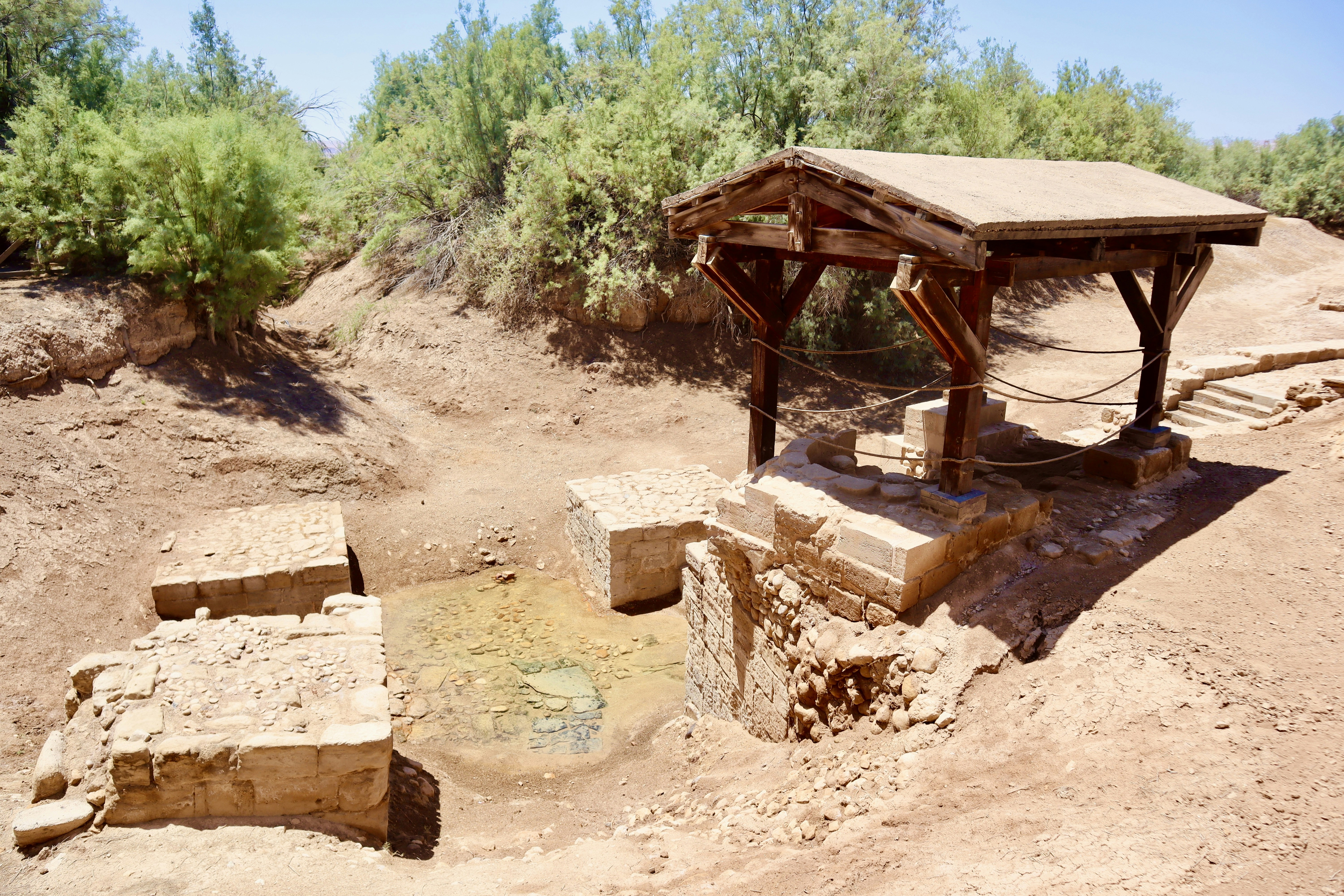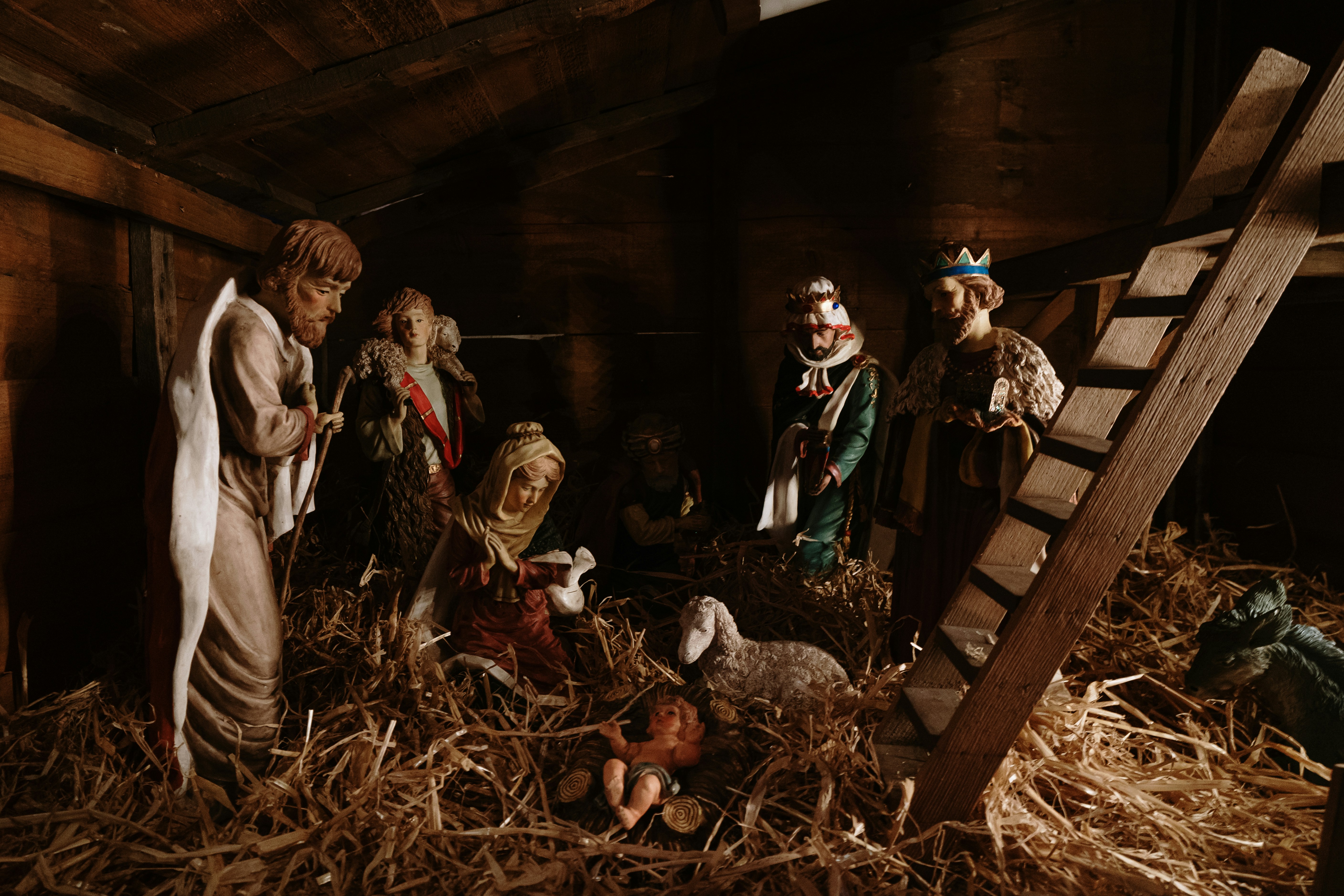Following Jesus: A 30-Day Journey Through the Gospel of Luke
Explore the life, teachings, and compassion of Jesus in this 30-day devotional study through the Gospel of Luke. Discover certainty, purpose, and hope in Christ.
Table of Contents
Table of Contents
📝 Introduction
The Gospel of Luke stands as one of the most detailed, compassionate, and historically grounded accounts of Jesus’ life, ministry, death, and resurrection. Written by Luke, a physician and companion of the Apostle Paul, this Gospel was addressed to a man named Theophilus and crafted with the purpose of giving readers certainty about the things they had been taught concerning Christ (Luke 1:4).
Luke was not an eyewitness to Jesus’ ministry, but he carefully investigated everything, gathering firsthand accounts from those who were. His Gospel emphasizes Jesus' humanity, showing Him as the Savior who came for all people—Jews and Gentiles, rich and poor, men and women, insiders and outsiders.
One of Luke’s most powerful contributions is his emphasis on the compassion and mercy of Jesus. Luke includes stories found nowhere else—such as the Parable of the Good Samaritan and the story of the Prodigal Son—that reveal the heart of a Savior who came to seek and save the lost. You’ll also notice Luke’s unique focus on prayer, the role of the Holy Spirit, and the inclusion of women as key figures in God’s unfolding redemption.
This 30-day Bible Study Plan will walk you, day by day, through the Gospel’s major themes and movements. Each day includes a primary passage, a supporting Scripture, a devotional reflection, journal questions, and a closing prayer—all designed to help you grow in your understanding of Jesus and deepen your faith.
Whether you're new to the Bible or have read Luke many times before, this study invites you to slow down and see Jesus afresh. Let Luke’s words strengthen your certainty, expand your compassion, and transform how you live as a follower of Christ.
📅 Day 1: An Orderly Account
📖 Primary Scripture:
Luke 1:1–4 (NIV)
Many have undertaken to draw up an account of the things that have been fulfilled among us,
just as they were handed down to us by those who from the first were eyewitnesses and servants of the word.
With this in mind, since I myself have carefully investigated everything from the beginning, I too decided to write an orderly account for you, most excellent Theophilus,
so that you may know the certainty of the things you have been taught.
📖 Supporting Scripture:
2 Timothy 3:16 (NIV)
All Scripture is God-breathed and is useful for teaching, rebuking, correcting and training in righteousness.
📚 Devotional:
Luke begins his Gospel with clarity and purpose. He wants Theophilus—and us—to know that the life and ministry of Jesus are not myths or legends, but carefully researched, eyewitness-confirmed truth. His account is grounded in historical investigation and spiritual conviction.
Luke was a physician by trade and a detail-oriented writer. He wasn’t one of the original twelve disciples, but he traveled with Paul and became a trusted chronicler of the Gospel and the early church. His aim was not just to inform, but to build certainty in the hearts of those who follow Jesus.
In a world filled with questions and doubts, God’s Word is an anchor. Luke’s Gospel invites us to know Jesus more clearly—not through emotion or rumor, but through the solid foundation of Scripture and truth.
🖊️ Journal Questions:
- How do I usually approach the Gospels—out of curiosity, habit, or hunger for truth?
- What does it mean to me personally that Luke wrote to give “certainty” to our faith?
- Am I allowing God’s Word to shape and anchor my beliefs?
🙏 Prayer:
Lord, thank You for inspiring Luke to write an orderly, trustworthy account of Your life and ministry. As I begin this journey through the Book of Luke, open my heart and mind to Your truth. Help me grow in confidence and clarity about who You are and what You’ve done. Amen.
📅 Day 2: Zechariah Doubts the Promise
📖 Primary Scripture:
Luke 1:5–25 (NIV)
In the time of Herod king of Judea there was a priest named Zechariah, who belonged to the priestly division of Abijah; his wife Elizabeth was also a descendant of Aaron.
Both of them were righteous in the sight of God, observing all the Lord’s commands and decrees blamelessly.
But they were childless because Elizabeth was not able to conceive, and they were both very old.
Once when Zechariah’s division was on duty and he was serving as priest before God,
he was chosen by lot, according to the custom of the priesthood, to go into the temple of the Lord and burn incense.
And when the time for the burning of incense came, all the assembled worshipers were praying outside.
Then an angel of the Lord appeared to him, standing at the right side of the altar of incense.
When Zechariah saw him, he was startled and was gripped with fear.
But the angel said to him: “Do not be afraid, Zechariah; your prayer has been heard. Your wife Elizabeth will bear you a son, and you are to call him John.
He will be a joy and delight to you, and many will rejoice because of his birth,
for he will be great in the sight of the Lord. He is never to take wine or other fermented drink, and he will be filled with the Holy Spirit even before he is born.
He will bring back many of the people of Israel to the Lord their God.
And he will go on before the Lord, in the spirit and power of Elijah, to turn the hearts of the parents to their children and the disobedient to the wisdom of the righteous—to make ready a people prepared for the Lord.”
Zechariah asked the angel, “How can I be sure of this? I am an old man and my wife is well along in years.”
The angel said to him, “I am Gabriel. I stand in the presence of God, and I have been sent to speak to you and to tell you this good news.
And now you will be silent and not able to speak until the day this happens, because you did not believe my words, which will come true at their appointed time.”
Meanwhile, the people were waiting for Zechariah and wondering why he stayed so long in the temple.
When he came out, he could not speak to them. They realized he had seen a vision in the temple, for he kept making signs to them but remained unable to speak.
When his time of service was completed, he returned home.
After this his wife Elizabeth became pregnant and for five months remained in seclusion.
“The Lord has done this for me,” she said. “In these days he has shown his favor and taken away my disgrace among the people.”
📖 Supporting Scripture:
Hebrews 10:23 (NIV)
Let us hold unswervingly to the hope we profess, for he who promised is faithful.
📚 Devotional:
Zechariah and Elizabeth were faithful and obedient, yet they carried deep disappointment—years of unanswered prayers and unfulfilled longings. They were elderly and childless in a culture that saw that as shameful. And then one day, in the middle of routine priestly duties, everything changed.
God sent the angel Gabriel with a promise: your prayer has been heard. The answer wasn’t just a personal blessing—it would launch a movement to prepare the way for the Messiah.
But Zechariah, though righteous, responded with doubt. “How can I be sure of this?” It wasn’t just a question—it was a limitation on what he believed God could still do.
God graciously fulfilled His promise anyway, but Zechariah lost his voice for a season—a quiet space where faith could grow.
Like Zechariah, we can follow God faithfully and still struggle to believe that He’ll come through in our specific situation. But God's promises are not based on our perfect faith—they’re based on His perfect faithfulness.
🖊️ Journal Questions:
- What long-standing prayer or hope have I quietly stopped believing God can answer?
- How do I usually respond when God speaks something that seems “too good to be true”?
- In what areas is God inviting me to trust Him even when I don’t understand?
🙏 Prayer:
Faithful God, thank You for hearing my prayers—even the ones I’ve stopped praying. Forgive me for doubting what You are capable of. Strengthen my faith to believe Your promises and trust Your timing. Help me hold unswervingly to the hope I profess, because You are always faithful. Amen.
📅 Day 3: Mary’s Divine Appointment
📖 Primary Scripture:
Luke 1:26–38 (NIV)
In the sixth month of Elizabeth’s pregnancy, God sent the angel Gabriel to Nazareth, a town in Galilee,
to a virgin pledged to be married to a man named Joseph, a descendant of David. The virgin’s name was Mary.
The angel went to her and said, “Greetings, you who are highly favored! The Lord is with you.”
Mary was greatly troubled at his words and wondered what kind of greeting this might be.
But the angel said to her, “Do not be afraid, Mary; you have found favor with God.
You will conceive and give birth to a son, and you are to call him Jesus.
He will be great and will be called the Son of the Most High. The Lord God will give him the throne of his father David,
and he will reign over Jacob’s descendants forever; his kingdom will never end.”
“How will this be,” Mary asked the angel, “since I am a virgin?”
The angel answered, “The Holy Spirit will come on you, and the power of the Most High will overshadow you. So the holy one to be born will be called the Son of God.
Even Elizabeth your relative is going to have a child in her old age, and she who was said to be unable to conceive is in her sixth month.
For no word from God will ever fail.”
“I am the Lord’s servant,” Mary answered. “May your word to me be fulfilled.” Then the angel left her.
📖 Supporting Scripture:
Jeremiah 1:5 (NIV)
“Before I formed you in the womb I knew you, before you were born I set you apart; I appointed you as a prophet to the nations.”
📚 Devotional:
Mary was young, unknown, and living in a small town. She didn’t hold any spiritual or social authority. Yet God chose her for the most sacred and history-altering role: to carry His Son into the world.
When the angel Gabriel told Mary she was highly favored, she was troubled. Like many of us, she probably wondered, Why me? But God wasn’t looking for someone powerful—He was looking for someone willing. And Mary responded with stunning faith: “I am the Lord’s servant… may your word to me be fulfilled.”
God didn’t explain everything. The path ahead would involve risk, rejection, and deep mystery. But Mary trusted God’s heart, even when she couldn’t see His whole plan.
God still chooses unlikely people to carry out His purposes. Like Mary, we may feel unprepared or afraid. But if we’re willing, God’s Spirit will work through us to accomplish His will.
🖊️ Journal Questions:
- How do I usually respond when God calls me to something unexpected or uncomfortable?
- What would it look like for me to say, “I am the Lord’s servant” in a current situation?
- Where is God inviting me to trust His Word even when I don’t fully understand His plan?
🙏 Prayer:
Father, thank You for choosing the humble and willing to do great things. Like Mary, I want to say yes to Your call—even when it’s unclear or hard. Grow in me a heart of faith and surrender. Help me trust that no word from You will ever fail. May Your will be done in my life. Amen.
📅 Day 4: Mary Visits Elizabeth
📖 Primary Scripture:
Luke 1:39–56 (NIV)
At that time Mary got ready and hurried to a town in the hill country of Judea,
where she entered Zechariah’s home and greeted Elizabeth.
When Elizabeth heard Mary’s greeting, the baby leaped in her womb, and Elizabeth was filled with the Holy Spirit.
In a loud voice she exclaimed: “Blessed are you among women, and blessed is the child you will bear!
But why am I so favored, that the mother of my Lord should come to me?
As soon as the sound of your greeting reached my ears, the baby in my womb leaped for joy.
Blessed is she who has believed that the Lord would fulfill his promises to her!”
And Mary said:
“My soul glorifies the Lord
and my spirit rejoices in God my Savior,
for he has been mindful
of the humble state of his servant.
From now on all generations will call me blessed,
for the Mighty One has done great things for me—
holy is his name.
His mercy extends to those who fear him,
from generation to generation.
He has performed mighty deeds with his arm;
he has scattered those who are proud in their inmost thoughts.
He has brought down rulers from their thrones
but has lifted up the humble.
He has filled the hungry with good things
but has sent the rich away empty.
He has helped his servant Israel,
remembering to be merciful
to Abraham and his descendants forever,
just as he promised our ancestors.”
Mary stayed with Elizabeth for about three months and then returned home.
📖 Supporting Scripture:
Romans 12:15 (NIV)
Rejoice with those who rejoice; mourn with those who mourn.
📚 Devotional:
Mary didn’t isolate herself after receiving the angel’s message—she sought the company of someone who would understand. Elizabeth, also miraculously pregnant, welcomed her with joy and spiritual insight. The Holy Spirit filled Elizabeth, and her words confirmed what God was doing in Mary.
Mary responded with worship. Her song—often called the Magnificat—is a powerful declaration of God’s mercy, justice, and faithfulness. It echoes Old Testament praise and proclaims that God lifts the humble and keeps His promises to His people.
This passage reminds us of the power of godly companionship. When we are walking through seasons of change, uncertainty, or calling, we need people who recognize God’s work in our lives and encourage our faith. And we should be that kind of person for others, too.
Like Mary, we are invited to rejoice in the faithfulness of God—not just privately, but together in community.
🖊️ Journal Questions:
- Who in my life encourages my faith and recognizes God’s work in me?
- How can I be like Elizabeth—speaking life, affirmation, and truth into others?
- What promises of God am I celebrating today?
🙏 Prayer:
Lord, thank You for placing people in my life who strengthen my faith. Help me to seek out godly community and be a source of joy and encouragement to others. Like Mary, I want to glorify You with my life and trust Your promises, knowing You always lift the humble and remember Your people. Amen.
📅 Day 5: The Birth of John the Baptist
📖 Primary Scripture:
Luke 1:57–66 (NIV)
When it was time for Elizabeth to have her baby, she gave birth to a son.
Her neighbors and relatives heard that the Lord had shown her great mercy, and they shared her joy.
On the eighth day they came to circumcise the child, and they were going to name him after his father Zechariah,
but his mother spoke up and said, “No! He is to be called John.”
They said to her, “There is no one among your relatives who has that name.”
Then they made signs to his father, to find out what he would like to name the child.
He asked for a writing tablet, and to everyone’s astonishment he wrote, “His name is John.”
Immediately his mouth was opened and his tongue set free, and he began to speak, praising God.
All the neighbors were filled with awe, and throughout the hill country of Judea people were talking about all these things.
Everyone who heard this wondered about it, asking, “What then is this child going to be?” For the Lord’s hand was with him.
📖 Supporting Scripture:
Psalm 115:1 (NIV)
Not to us, Lord, not to us but to your name be the glory, because of your love and faithfulness.
📚 Devotional:
God’s promise to Zechariah and Elizabeth was fulfilled: a healthy baby boy, born in their old age, surrounded by community and joy. This moment was not just about the birth of a child—it was the beginning of a prophetic mission that would prepare the way for the Messiah.
Elizabeth defied cultural expectations by naming him John, and Zechariah confirmed it in faith. As soon as he obeyed, his voice was restored, and the first words out of his mouth were praise. What began with doubt ended in worship.
The entire region was stirred with wonder. People could sense that something significant was unfolding. They saw that “the Lord’s hand was with him,” and they asked, “What then is this child going to be?”
This story reminds us that when we walk in obedience—even when it challenges traditions or expectations—God is glorified, and others are drawn to wonder. Faithful obedience opens the door to joyful praise and powerful testimony.
🖊️ Journal Questions:
- Is there an area of my life where I need to respond with obedient faith instead of hesitation?
- How can I give God glory in a way that causes others to wonder at His goodness?
- What’s one thing I can do today that reflects trust in God’s promises?
🙏 Prayer:
Lord, You are faithful to every promise. Thank You for fulfilling Your word in ways that draw praise and stir awe. Help me walk in bold obedience—even when it doesn’t make sense to others. Let my life be a reflection of Your mercy and a testimony that causes others to glorify You. Amen.
📅 Day 6: Zechariah’s Song of Praise
📖 Primary Scripture:
Luke 1:67–80 (NIV)
His father Zechariah was filled with the Holy Spirit and prophesied:
“Praise be to the Lord, the God of Israel,
because he has come to his people and redeemed them.
He has raised up a horn of salvation for us
in the house of his servant David
(as he said through his holy prophets of long ago),
salvation from our enemies
and from the hand of all who hate us—
to show mercy to our ancestors
and to remember his holy covenant,
the oath he swore to our father Abraham:
to rescue us from the hand of our enemies,
and to enable us to serve him without fear
in holiness and righteousness before him all our days.
And you, my child, will be called a prophet of the Most High;
for you will go on before the Lord to prepare the way for him,
to give his people the knowledge of salvation
through the forgiveness of their sins,
because of the tender mercy of our God,
by which the rising sun will come to us from heaven
to shine on those living in darkness
and in the shadow of death,
to guide our feet into the path of peace.”
And the child grew and became strong in spirit; and he lived in the wilderness until he appeared publicly to Israel.
📖 Supporting Scripture:
Isaiah 9:2 (NIV)
The people walking in darkness have seen a great light; on those living in the land of deep darkness a light has dawned.
📚 Devotional:
After months of silence, Zechariah’s first words were filled with Spirit-led praise and prophecy. His song, often called the Benedictus, reveals the deep hope of Israel and the profound mercy of God.
Zechariah celebrates not only the birth of his son John but also the unfolding of God’s plan of redemption. He speaks of a Savior—a horn of salvation—coming from the house of David, fulfilling ancient promises, and bringing rescue and righteousness.
He recognizes John’s role as a prophet who will prepare the way for the Lord, and he proclaims that salvation will come through forgiveness of sins—not military victory or political change, but the mercy of God shining light into the darkness.
This passage reminds us to anchor our faith in God’s long-term faithfulness. What God began centuries ago, He continues today—redeeming, restoring, and leading His people into peace through Jesus.
🖊️ Journal Questions:
- What part of Zechariah’s song resonates with my current season of life or faith?
- How can I speak words of praise and prophecy into the lives of others like Zechariah did for his son?
- Where in my life do I need to embrace the mercy and peace of God today?
🙏 Prayer:
Faithful God, You never forget Your promises. Thank You for the light that shines into my darkness and the peace You offer through Christ. Fill my mouth with praise and my heart with hope. May I, like Zechariah, speak life, blessing, and truth as I walk in the light of Your mercy. Amen.
📅 Day 7: The Birth of Jesus
📖 Primary Scripture:
Luke 2:1–20 (NIV)
In those days Caesar Augustus issued a decree that a census should be taken of the entire Roman world.
(This was the first census that took place while Quirinius was governor of Syria.)
And everyone went to their own town to register.
So Joseph also went up from the town of Nazareth in Galilee to Judea, to Bethlehem the town of David, because he belonged to the house and line of David.
He went there to register with Mary, who was pledged to be married to him and was expecting a child.
While they were there, the time came for the baby to be born,
and she gave birth to her firstborn, a son. She wrapped him in cloths and placed him in a manger, because there was no guest room available for them.
And there were shepherds living out in the fields nearby, keeping watch over their flocks at night.
An angel of the Lord appeared to them, and the glory of the Lord shone around them, and they were terrified.
But the angel said to them, “Do not be afraid. I bring you good news that will cause great joy for all the people.
Today in the town of David a Savior has been born to you; he is the Messiah, the Lord.
This will be a sign to you: You will find a baby wrapped in cloths and lying in a manger.”
Suddenly a great company of the heavenly host appeared with the angel, praising God and saying,
“Glory to God in the highest heaven, and on earth peace to those on whom his favor rests.”
When the angels had left them and gone into heaven, the shepherds said to one another, “Let’s go to Bethlehem and see this thing that has happened, which the Lord has told us about.”
So they hurried off and found Mary and Joseph, and the baby, who was lying in the manger.
When they had seen him, they spread the word concerning what had been told them about this child,
and all who heard it were amazed at what the shepherds said to them.
But Mary treasured up all these things and pondered them in her heart.
The shepherds returned, glorifying and praising God for all the things they had heard and seen, which were just as they had been told.
📖 Supporting Scripture:
Micah 5:2 (NIV)
But you, Bethlehem Ephrathah, though you are small among the clans of Judah, out of you will come for me one who will be ruler over Israel…
📚 Devotional:
In the most unexpected way and place, the Savior of the world entered human history—not with royalty or riches, but in humility and obscurity. Born in a stable, wrapped in cloth, and laid in a manger, Jesus’ arrival turned worldly expectations upside down.
God announced this world-changing moment not to kings, but to shepherds—ordinary, overlooked men faithfully doing their job. Heaven broke into earth with angelic glory and a message of peace: “A Savior has been born to you.”
The shepherds responded with urgency, wonder, and worship. They didn’t keep the news to themselves—they shared it. And Mary, young and brave, pondered all of it deeply.
This passage reminds us that God draws near to the lowly, speaks to the humble, and fulfills His promises through quiet power. The incarnation—God becoming man—is the greatest gift, and it invites us to rejoice, reflect, and respond.
🖊️ Journal Questions:
- How does Jesus’ humble birth change the way I view God’s approach to power and greatness?
- What parts of this story am I tempted to rush past, instead of treasure and ponder like Mary?
- Who in my life needs to hear the “good news that brings great joy”?
🙏 Prayer:
Jesus, thank You for stepping into our world with humility and grace. Your birth brought light into darkness and peace to the brokenhearted. Help me respond like the shepherds—with awe, praise, and urgency to share. Teach me to treasure Your presence and ponder Your goodness daily. Amen.
📅 Day 8: Jesus Presented at the Temple
📖 Primary Scripture:
Luke 2:21–40 (NIV)
On the eighth day, when it was time to circumcise the child, he was named Jesus, the name the angel had given him before he was conceived.
When the time came for the purification rites required by the Law of Moses, Joseph and Mary took him to Jerusalem to present him to the Lord
(as it is written in the Law of the Lord, “Every firstborn male is to be consecrated to the Lord”),
and to offer a sacrifice in keeping with what is said in the Law of the Lord: “a pair of doves or two young pigeons.”
Now there was a man in Jerusalem called Simeon, who was righteous and devout. He was waiting for the consolation of Israel, and the Holy Spirit was on him.
It had been revealed to him by the Holy Spirit that he would not die before he had seen the Lord’s Messiah.
Moved by the Spirit, he went into the temple courts. When the parents brought in the child Jesus to do for him what the custom of the Law required,
Simeon took him in his arms and praised God, saying:
“Sovereign Lord, as you have promised, you may now dismiss your servant in peace.
For my eyes have seen your salvation,
which you have prepared in the sight of all nations:
a light for revelation to the Gentiles, and the glory of your people Israel.”
The child’s father and mother marveled at what was said about him.
Then Simeon blessed them and said to Mary, his mother: “This child is destined to cause the falling and rising of many in Israel, and to be a sign that will be spoken against,
so that the thoughts of many hearts will be revealed. And a sword will pierce your own soul too.”
There was also a prophet, Anna, the daughter of Penuel, of the tribe of Asher. She was very old; she had lived with her husband seven years after her marriage,
and then was a widow until she was eighty-four. She never left the temple but worshiped night and day, fasting and praying.
Coming up to them at that very moment, she gave thanks to God and spoke about the child to all who were looking forward to the redemption of Jerusalem.
When Joseph and Mary had done everything required by the Law of the Lord, they returned to Galilee to their own town of Nazareth.
And the child grew and became strong; he was filled with wisdom, and the grace of God was on him.
📖 Supporting Scripture:
Isaiah 40:1–2 (NIV)
Comfort, comfort my people, says your God. Speak tenderly to Jerusalem... that her sin has been paid for.
📚 Devotional:
Mary and Joseph brought Jesus to the temple in obedience to the Law, and in doing so, they encountered two elderly saints—Simeon and Anna—who had been waiting their whole lives for the Messiah. Their long hope was fulfilled not in a grand arrival, but in the arms of a baby.
Simeon’s words declared Jesus to be the salvation for all nations—not only Israel, but also the Gentiles. He saw what many others missed: this child would bring light, but also division, and Mary’s own heart would be pierced.
Anna, a prophet who never left the temple, instantly recognized God’s redemptive plan and shared the news with others. These two faithful servants remind us that spiritual maturity comes through a lifetime of faithful waiting, worship, and prayer.
The quiet moments in the temple held immense significance. God was unfolding His redemption, and those tuned to His Spirit recognized it—not through position or power, but through humble devotion.
🖊️ Journal Questions:
- What can I learn from the faithfulness and spiritual sensitivity of Simeon and Anna?
- Am I waiting on God for anything right now? How can I wait with faith and worship?
- How can I be more aware of the “quiet” ways God is moving in my life?
🙏 Prayer:
Lord, thank You for being faithful to fulfill Your promises. Help me wait well, like Simeon and Anna—anchored in worship and filled with hope. Give me eyes to see the quiet ways You’re at work, and the courage to speak of Your redemption to those who are seeking. Let Your grace rest on me as I grow in wisdom. Amen.
📅 Day 9: The Boy Jesus at the Temple
📖 Primary Scripture:
Luke 2:41–52 (NIV)
Every year Jesus’ parents went to Jerusalem for the Festival of the Passover.
When he was twelve years old, they went up to the festival, according to the custom.
After the festival was over, while his parents were returning home, the boy Jesus stayed behind in Jerusalem, but they were unaware of it.
Thinking he was in their company, they traveled on for a day. Then they began looking for him among their relatives and friends.
When they did not find him, they went back to Jerusalem to look for him.
After three days they found him in the temple courts, sitting among the teachers, listening to them and asking them questions.
Everyone who heard him was amazed at his understanding and his answers.
When his parents saw him, they were astonished. His mother said to him, “Son, why have you treated us like this? Your father and I have been anxiously searching for you.”
“Why were you searching for me?” he asked. “Didn’t you know I had to be in my Father’s house?”
But they did not understand what he was saying to them.
Then he went down to Nazareth with them and was obedient to them. But his mother treasured all these things in her heart.
And Jesus grew in wisdom and stature, and in favor with God and man.
📖 Supporting Scripture:
Proverbs 3:1–4 (NIV)
My son, do not forget my teaching, but keep my commands in your heart,
for they will prolong your life many years and bring you peace and prosperity.
Let love and faithfulness never leave you; bind them around your neck, write them on the tablet of your heart.
Then you will win favor and a good name in the sight of God and man.
📚 Devotional:
At twelve years old, Jesus was already seeking His Father with focus and clarity. While the festival was over and the crowds were heading home, Jesus remained in the temple—listening, asking questions, and astounding the teachers with His understanding.
His response to Mary—“Didn’t you know I had to be in my Father’s house?”—offers the first recorded glimpse into His divine identity and mission. Even as a child, Jesus was drawn to the presence of God and the truths of Scripture.
Yet, Jesus didn’t use His divine awareness to reject His human responsibilities. He returned home and was obedient to His earthly parents. He continued to grow—not only in spiritual wisdom, but also in character and favor with both God and people.
This passage reminds us that spiritual maturity isn’t just about knowledge—it’s about being rooted in God’s presence, obedient in everyday life, and growing in grace.
🖊️ Journal Questions:
- Do I make time to be in my “Father’s house”—in His presence and in His Word?
- How can I follow Jesus’ example of both spiritual passion and humble obedience?
- In what area of my life do I need to grow in wisdom, character, or favor?
🙏 Prayer:
Father, give me a heart like Jesus—one that longs to be in Your presence and delights in learning from You. Help me grow in wisdom and in favor with You and with others. Let my faith be evident not only in knowledge, but in obedience, humility, and love. Amen.
📅 Day 10: The Ministry of John the Baptist
📖 Primary Scripture:
Luke 3:1–20 (NIV)
In the fifteenth year of the reign of Tiberius Caesar—when Pontius Pilate was governor of Judea, Herod tetrarch of Galilee... the word of God came to John son of Zechariah in the wilderness.
He went into all the country around the Jordan, preaching a baptism of repentance for the forgiveness of sins.
As it is written in the book of the words of Isaiah the prophet:
“A voice of one calling in the wilderness,
‘Prepare the way for the Lord,
make straight paths for him.
Every valley shall be filled in,
every mountain and hill made low.
The crooked roads shall become straight,
the rough ways smooth.
And all people will see God’s salvation.’”
John said to the crowds coming out to be baptized by him, “You brood of vipers! Who warned you to flee from the coming wrath?
Produce fruit in keeping with repentance...
And do not begin to say to yourselves, ‘We have Abraham as our father.’
For I tell you that out of these stones God can raise up children for Abraham.”
The crowd asked, “What should we do then?”
John answered, “Anyone who has two shirts should share with the one who has none, and anyone who has food should do the same.”
Even tax collectors came to be baptized. “Teacher,” they asked, “what should we do?”
“Don’t collect any more than you are required to,” he told them.
Then some soldiers asked him, “And what should we do?”
He replied, “Don’t extort money and don’t accuse people falsely—be content with your pay.”
The people were waiting expectantly and were all wondering in their hearts if John might possibly be the Messiah.
John answered them all, “I baptize you with water. But one who is more powerful than I will come... He will baptize you with the Holy Spirit and fire.”
And with many other words John exhorted the people and proclaimed the good news to them.
But when John rebuked Herod the tetrarch because of his marriage to Herodias, his brother’s wife, and all the other evil things he had done,
Herod added this to them all: He locked John up in prison.
📖 Supporting Scripture:
Acts 3:19 (NIV)
Repent, then, and turn to God, so that your sins may be wiped out, that times of refreshing may come from the Lord.
📚 Devotional:
John’s voice echoed through the wilderness with urgency and clarity: “Prepare the way for the Lord.” His message wasn’t gentle—it was bold, confrontational, and full of truth. Yet it was also deeply rooted in grace: the promise that “all people will see God’s salvation.”
John called for genuine repentance—not just emotional responses, but transformed living. He told people to share, to act with integrity, to reject greed and corruption. Repentance wasn’t just a feeling—it was a turning toward justice, humility, and mercy.
Even when mistaken for the Messiah, John made it clear: “I’m not the one. But He is coming.” His entire ministry was about pointing people away from himself and toward Jesus.
John’s courage cost him his freedom. He spoke truth to power and was thrown in prison. Yet his boldness still prepares our hearts today—to lay down our pride, confess our sin, and make room for Christ.
🖊️ Journal Questions:
- What would “preparing the way for the Lord” look like in my heart right now?
- In what ways is God calling me to live out repentance with action?
- Am I pointing others toward Jesus in how I speak, live, and serve?
🙏 Prayer:
Lord, prepare my heart for You. Help me repent not just in words, but in how I live. Give me the courage of John—to speak truth, live with integrity, and point others to Jesus. Let my life make a clear path for You to work through me. Amen.
📅 Day 11: The Baptism of Jesus
📖 Primary Scripture:
Luke 3:21–22 (NIV)
When all the people were being baptized, Jesus was baptized too. And as he was praying, heaven was opened
and the Holy Spirit descended on him in bodily form like a dove. And a voice came from heaven:
“You are my Son, whom I love; with you I am well pleased.”
📖 Supporting Scripture:
Isaiah 42:1 (NIV)
“Here is my servant, whom I uphold, my chosen one in whom I delight; I will put my Spirit on him, and he will bring justice to the nations.”
📚 Devotional:
Though He was sinless, Jesus chose to be baptized—standing among the people as one of them. In this act, He fully identified with humanity and publicly affirmed the path He would walk: humility, obedience, and surrender.
As Jesus prayed, heaven opened. The Holy Spirit descended like a dove, and the Father’s voice affirmed His identity and mission: “You are my Son, whom I love; with you I am well pleased.” This moment marked the beginning of Jesus’ public ministry and displayed the full Trinity—Father, Son, and Spirit—in perfect unity.
God’s affirmation wasn’t based on performance. Jesus hadn’t yet healed the sick, taught crowds, or gone to the cross. The Father’s love and delight were rooted in who He was, not just what He would do.
That same truth applies to us. When we follow Christ, we are invited into that same love and affirmation. We don’t earn God’s favor—it is freely given in Christ. Our identity is rooted in being God’s beloved sons and daughters.
🖊️ Journal Questions:
- Do I believe God delights in me—not for what I do, but for who I am in Christ?
- How does Jesus’ humility in being baptized challenge my view of leadership and obedience?
- When have I experienced the Spirit’s presence affirming God’s love and purpose for me?
🙏 Prayer:
Father, thank You for calling me Your beloved. I don’t have to earn Your approval—it’s already mine in Christ. Teach me to walk in humble obedience, like Jesus did. Let my heart be open to Your Spirit and my ears tuned to Your voice of love and affirmation. Amen.
📅 Day 12: The Genealogy of Jesus
📖 Primary Scripture:
Luke 3:23–38 (NIV)
Now Jesus himself was about thirty years old when he began his ministry.
He was the son, so it was thought, of Joseph, the son of Heli,
the son of Matthat, the son of Levi...
(continues through generations)...
the son of Enosh, the son of Seth, the son of Adam, the son of God.
📖 Supporting Scripture:
Romans 5:18–19 (NIV)
Consequently, just as one trespass resulted in condemnation for all people, so also one righteous act resulted in justification and life for all people.
For just as through the disobedience of the one man the many were made sinners,
so also through the obedience of the one man the many will be made righteous.
📚 Devotional:
To modern readers, genealogies can feel like long lists to skim past. But in Scripture, every name holds meaning and purpose—especially here in Luke. While Matthew’s Gospel traces Jesus’ lineage through David and Abraham to emphasize His Jewish kingship, Luke takes it all the way back to Adam—the first man—and ultimately to God.
Luke’s purpose is clear: Jesus didn’t just come for Israel—He came for everyone. By linking Jesus to Adam, Luke shows that Jesus is the Redeemer of all humanity. Where Adam failed, Christ would overcome. He is the new Adam, ushering in a new creation through His obedience and sacrifice.
This passage reminds us that our faith is deeply rooted in real history. Jesus entered into the human family tree—with all its flaws and failures—to redeem it. Your story matters to God, and so does your place in His unfolding plan.
🖊️ Journal Questions:
- What does it mean to me that Jesus is connected to both royalty and humanity—David and Adam?
- How does knowing Jesus came for all people shape the way I view others?
- In what ways is God writing His redemption story through my own family or personal history?
🙏 Prayer:
Jesus, thank You for stepping into humanity’s story to redeem it from the inside out. You are the true and better Adam, the Savior of all. Help me see my life and family through the lens of Your grace. Write Your redemption story in me—and through me for others to see. Amen.
📅 Day 13: The Temptation of Jesus
📖 Primary Scripture:
Luke 4:1–13 (NIV)
Jesus, full of the Holy Spirit, left the Jordan and was led by the Spirit into the wilderness,
where for forty days he was tempted by the devil. He ate nothing during those days, and at the end of them he was hungry.
The devil said to him, “If you are the Son of God, tell this stone to become bread.”
Jesus answered, “It is written: ‘Man shall not live on bread alone.’”
The devil led him up to a high place and showed him in an instant all the kingdoms of the world.
And he said to him, “I will give you all their authority and splendor... If you worship me, it will all be yours.”
Jesus answered, “It is written: ‘Worship the Lord your God and serve him only.’”
The devil led him to Jerusalem and had him stand on the highest point of the temple.
“If you are the Son of God,” he said, “throw yourself down from here. For it is written:
‘He will command his angels concerning you... they will lift you up in their hands,
so that you will not strike your foot against a stone.’”
Jesus answered, “It is said: ‘Do not put the Lord your God to the test.’”
When the devil had finished all this tempting, he left him until an opportune time.
📖 Supporting Scripture:
Hebrews 4:15 (NIV)
For we do not have a high priest who is unable to empathize with our weaknesses,
but we have one who has been tempted in every way, just as we are—yet he did not sin.
📚 Devotional:
Before His public ministry began, Jesus was led by the Spirit into the wilderness. There, alone and physically weakened, He faced temptation from the devil himself. Each test targeted a core area of human struggle: physical need, identity, power, and trust in God.
Yet Jesus responded not with debate, but with Scripture. He resisted each temptation by standing firm in truth. He didn’t act out of pride, fear, or hunger. He remained obedient to the Father’s will and faithful to His mission.
What’s remarkable is not just that Jesus overcame temptation—but that He understands it. He’s not a distant Savior. He’s been in the wilderness. He’s felt the pressure. And because of that, He can strengthen us in our own battles.
Temptation is not a sign that God is absent—it’s often the place where our faith is forged. With the Spirit’s help and the Word as our weapon, we too can resist and walk in victory.
🖊️ Journal Questions:
- What area of my life is most vulnerable to temptation right now?
- How can I follow Jesus’ example by using Scripture to stand firm?
- Do I truly believe that Jesus understands my struggles and offers strength in them?
🙏 Prayer:
Jesus, thank You for stepping into the wilderness for me—and for overcoming what I often fail to resist. Help me stand firm in truth when I am tempted. Fill me with Your Spirit and give me a hunger for Your Word, that I may walk in Your strength and victory. Amen.
📅 Day 14: Jesus Begins His Ministry

📖 Primary Scripture:
Luke 4:14–30 (NIV)
Jesus returned to Galilee in the power of the Spirit, and news about him spread through the whole countryside.
He was teaching in their synagogues, and everyone praised him.
He went to Nazareth, where he had been brought up, and on the Sabbath day he went into the synagogue, as was his custom. He stood up to read,
and the scroll of the prophet Isaiah was handed to him. Unrolling it, he found the place where it is written:
“The Spirit of the Lord is on me,
because he has anointed me
to proclaim good news to the poor.
He has sent me to proclaim freedom for the prisoners
and recovery of sight for the blind,
to set the oppressed free,
to proclaim the year of the Lord’s favor.”
Then he rolled up the scroll, gave it back to the attendant and sat down. The eyes of everyone in the synagogue were fastened on him.
He began by saying to them, “Today this scripture is fulfilled in your hearing.”
All spoke well of him and were amazed at the gracious words that came from his lips. “Isn’t this Joseph’s son?” they asked.
Jesus said to them, “Surely you will quote this proverb to me: ‘Physician, heal yourself!’ And you will tell me, ‘Do here in your hometown what we have heard that you did in Capernaum.’”
“Truly I tell you,” he continued, “no prophet is accepted in his hometown...”
(He recounts examples of God blessing Gentiles, not Israelites.)
All the people in the synagogue were furious when they heard this.
They got up, drove him out of the town, and took him to the brow of the hill... to throw him off the cliff.
But he walked right through the crowd and went on his way.
📖 Supporting Scripture:
Isaiah 61:1–2 (NIV)
The Spirit of the Sovereign Lord is on me, because the Lord has anointed me to proclaim good news to the poor... to bind up the brokenhearted…
📚 Devotional:
Jesus’ public ministry begins with power and clarity. He reads a prophecy from Isaiah that describes the mission of the Messiah—and then boldly declares: “Today this scripture is fulfilled in your hearing.”
At first, the crowd is amazed. But as Jesus begins to challenge their assumptions, their admiration turns to rage. He confronts their pride, reminds them of God’s mercy to outsiders, and exposes their resistance to truth. Instead of celebrating the good news, they try to silence the messenger.
This moment reminds us that the gospel comforts the humble but offends the proud. Jesus came not only to heal and free—but to confront and transform. And transformation is often uncomfortable.
Faith isn’t about fitting Jesus into our expectations—it’s about surrendering to His authority, even when it disrupts us. Like the crowd, we must decide: will we receive Him as He is, or reject Him for who we want Him to be?
🖊️ Journal Questions:
- Are there ways I’ve resisted the uncomfortable parts of Jesus’ message?
- What part of Jesus’ mission—healing, freedom, sight, good news—do I need most right now?
- How can I open my heart to be both comforted and challenged by Him?
🙏 Prayer:
Jesus, thank You for proclaiming good news that reaches the poor, the broken, and the blind—including me. Help me receive You fully—not just the parts that comfort, but also the parts that confront. Shape my heart to love Your truth and live in Your freedom. Amen.
📅 Day 15: Jesus Drives Out an Impure Spirit
📖 Primary Scripture:
Luke 4:31–37 (NIV)
Then he went down to Capernaum, a town in Galilee, and on the Sabbath he taught the people.
They were amazed at his teaching, because his words had authority.
In the synagogue there was a man possessed by a demon, an impure spirit. He cried out at the top of his voice,
“Go away! What do you want with us, Jesus of Nazareth? Have you come to destroy us? I know who you are—the Holy One of God!”
“Be quiet!” Jesus said sternly. “Come out of him!”
Then the demon threw the man down before them all and came out without injuring him.
All the people were amazed and said to each other, “What words these are! With authority and power he gives orders to impure spirits and they come out!”
And the news about him spread throughout the surrounding area.
📖 Supporting Scripture:
1 John 3:8 (NIV)
The reason the Son of God appeared was to destroy the devil’s work.
📚 Devotional:
After being rejected in Nazareth, Jesus went to Capernaum and began teaching with authority—and people noticed. He didn’t just explain Scripture; His words carried divine power. The people were amazed, not only at His teaching, but at how His authority extended into the spiritual realm.
When a demon-possessed man interrupted the synagogue gathering, Jesus didn’t back away or debate. He spoke with authority: “Be quiet! Come out of him!” The spirit obeyed. No rituals. No struggle. Just the spoken word of the Son of God.
Even the demons recognized Jesus’ identity: “The Holy One of God.” They knew His authority and feared it. Jesus didn’t come just to teach or heal—He came to confront and destroy evil. And He still does.
In a world plagued by brokenness, spiritual oppression, and fear, Jesus’ authority remains unmatched. He’s not only the teacher of truth—He’s the One who sets people free.
🖊️ Journal Questions:
- What does Jesus’ authority mean to me personally in areas of spiritual struggle or fear?
- Do I truly believe He still has power to set people free—from lies, sin, addiction, or oppression?
- How can I grow in confidence in Jesus’ authority and invite His power into my daily life?
🙏 Prayer:
Jesus, You are the Holy One of God, full of truth and power. Thank You for coming to destroy the works of darkness and set people free. Speak into my life with Your authority. Drive out fear, lies, and anything that opposes Your truth. I trust in Your power and rest in Your presence. Amen.
📅 Day 16: Jesus Heals Many
📖 Primary Scripture:
Luke 4:38–44 (NIV)
Jesus left the synagogue and went to the home of Simon.
Now Simon’s mother-in-law was suffering from a high fever, and they asked Jesus to help her.
So he bent over her and rebuked the fever, and it left her. She got up at once and began to wait on them.
At sunset, the people brought to Jesus all who had various kinds of sickness, and laying his hands on each one, he healed them.
Moreover, demons came out of many people, shouting, “You are the Son of God!”
But he rebuked them and would not allow them to speak, because they knew he was the Messiah.
At daybreak, Jesus went out to a solitary place.
The people were looking for him and when they came to where he was, they tried to keep him from leaving them.
But he said, “I must proclaim the good news of the kingdom of God to the other towns also, because that is why I was sent.”
And he kept on preaching in the synagogues of Judea.
📖 Supporting Scripture:
Psalm 147:3 (NIV)
He heals the brokenhearted and binds up their wounds.
📚 Devotional:
Jesus’ compassion didn’t stay in the synagogue. As soon as He left, He was asked to help Simon Peter’s mother-in-law—and He did. He healed her with a word, and she immediately rose to serve. That one private healing led to many others. By evening, crowds had gathered at the door.
Jesus didn’t rush through them. He laid hands on each one. He met individuals with care, power, and healing. The sick were restored, the oppressed were set free, and the people didn’t want Him to leave.
But Jesus reminded them—and us—of His purpose: “I must proclaim the good news of the kingdom of God to the other towns also.” His mission was bigger than miracles. The healings pointed to a deeper truth: the kingdom of God was breaking into the world.
This passage reminds us that Jesus meets both our physical and spiritual needs. He’s close to the hurting and willing to heal. But He also calls us beyond comfort to follow His mission—spreading the good news to others.
🖊️ Journal Questions:
- Where in my life do I need the healing touch of Jesus—physically, emotionally, or spiritually?
- How has Jesus shown compassion to me personally?
- Who around me needs to experience the hope of His kingdom through my words or actions?
🙏 Prayer:
Jesus, thank You for Your compassion and power. You see my pain and respond with healing. Touch the broken places in my life and use me to bring hope to others. Let me never cling to comfort more than I follow Your mission. Fill me with Your Spirit to carry Your good news wherever You lead. Amen.
📅 Day 17: Jesus Calls His First Disciples
📖 Primary Scripture:
Luke 5:1–11 (NIV)
One day as Jesus was standing by the Lake of Gennesaret, the people were crowding around him and listening to the word of God.
He saw at the water’s edge two boats, left there by the fishermen, who were washing their nets.
He got into one of the boats, the one belonging to Simon, and asked him to put out a little from shore.
Then he sat down and taught the people from the boat.
When he had finished speaking, he said to Simon, “Put out into deep water, and let down the nets for a catch.”
Simon answered, “Master, we’ve worked hard all night and haven’t caught anything. But because you say so, I will let down the nets.”
When they had done so, they caught such a large number of fish that their nets began to break.
So they signaled their partners in the other boat to come and help them, and they came and filled both boats so full that they began to sink.
When Simon Peter saw this, he fell at Jesus’ knees and said, “Go away from me, Lord; I am a sinful man!”
For he and all his companions were astonished at the catch of fish they had taken,
and so were James and John, the sons of Zebedee, Simon’s partners.
Then Jesus said to Simon, “Don’t be afraid; from now on you will fish for people.”
So they pulled their boats up on shore, left everything and followed him.
📖 Supporting Scripture:
Matthew 16:24 (NIV)
Then Jesus said to his disciples, “Whoever wants to be my disciple must deny themselves and take up their cross and follow me.”
📚 Devotional:
Simon Peter and his fellow fishermen were exhausted and empty-handed. They had worked all night and caught nothing. Then Jesus stepped into Peter’s boat, taught the crowds, and asked Peter to do something that made little sense: try again.
Peter obeyed—not because it seemed logical, but because Jesus asked. And what followed was a miracle—a catch so large it nearly sank the boats.
That moment opened Peter’s eyes. He saw not just fish, but holiness. He fell to his knees, aware of his own unworthiness. But Jesus responded with grace and calling: “Don’t be afraid; from now on you will fish for people.”
Jesus meets us in the middle of our failure, turns our emptiness into overflow, and then calls us to something greater. Following Him requires leaving behind our old priorities, comforts, and securities. But it leads us into a life of purpose, mission, and relationship with the Living God.
🖊️ Journal Questions:
- Where is Jesus asking me to obey, even when it doesn’t make sense?
- What is Jesus calling me to “leave behind” in order to follow Him more fully?
- How can I share the abundance He’s given me with others who need hope?
🙏 Prayer:
Jesus, thank You for meeting me in my weakness and inviting me to follow You. Even when I feel unworthy, You speak purpose and peace. Help me trust You enough to obey when it’s hard, and bold enough to leave behind what no longer fits Your call. Make me a fisher of people, anchored in Your love. Amen.
📅 Day 18: Jesus Heals a Man With Leprosy
📖 Primary Scripture:
Luke 5:12–16 (NIV)
While Jesus was in one of the towns, a man came along who was covered with leprosy.
When he saw Jesus, he fell with his face to the ground and begged him, “Lord, if you are willing, you can make me clean.”
Jesus reached out his hand and touched the man. “I am willing,” he said. “Be clean!”
And immediately the leprosy left him.
Then Jesus ordered him, “Don’t tell anyone, but go, show yourself to the priest and offer the sacrifices that Moses commanded for your cleansing, as a testimony to them.”
Yet the news about him spread all the more, so that crowds of people came to hear him and to be healed of their sicknesses.
But Jesus often withdrew to lonely places and prayed.
📖 Supporting Scripture:
Psalm 34:18 (NIV)
The Lord is close to the brokenhearted and saves those who are crushed in spirit.
📚 Devotional:
Leprosy wasn’t just a painful disease—it was a sentence of isolation. Lepers were cut off from community, worship, and touch. This man, covered in leprosy, carried not only physical pain but deep emotional and spiritual rejection.
He approached Jesus with humility and faith: “Lord, if you are willing, you can make me clean.” And Jesus did something unimaginable—He touched him. Before the man was healed, Jesus met him in his unclean state with compassion. Then He spoke: “I am willing. Be clean.” Instantly, healing came.
This moment reveals Jesus’ heart. He doesn’t shrink back from our mess. He moves toward us, touches the untouchable, and speaks life into our brokenness. And yet, in the height of His growing popularity, Jesus withdrew to pray—grounded in the Father’s presence, not people’s praise.
God’s healing is not only physical—it’s emotional, relational, and spiritual. He still sees the outcast, touches the wounded, and makes the unclean whole.
🖊️ Journal Questions:
- What areas of my life feel “unclean” or broken—physically, emotionally, or spiritually?
- How does Jesus’ willingness to touch and heal encourage me today?
- Am I carving out quiet space like Jesus did to be alone with the Father?
🙏 Prayer:
Lord Jesus, thank You for Your compassion and power. You don’t just heal the body—you restore the soul. Touch the places in me that feel too damaged or distant, and speak Your words of cleansing and hope. Teach me to seek solitude with You, even in the busiest seasons. Amen.
📅 Day 19: Jesus Heals and Forgives a Paralyzed Man
📖 Primary Scripture:
Luke 5:17–26 (NIV)
One day Jesus was teaching, and Pharisees and teachers of the law were sitting there.
They had come from every village of Galilee and from Judea and Jerusalem.
And the power of the Lord was with Jesus to heal the sick.
Some men came carrying a paralyzed man on a mat and tried to take him into the house to lay him before Jesus.
When they could not find a way to do this because of the crowd, they went up on the roof and lowered him on his mat through the tiles into the middle of the crowd, right in front of Jesus.
When Jesus saw their faith, he said, “Friend, your sins are forgiven.”
The Pharisees and the teachers of the law began thinking to themselves, “Who is this fellow who speaks blasphemy? Who can forgive sins but God alone?”
Jesus knew what they were thinking and asked, “Why are you thinking these things in your hearts?
Which is easier: to say, ‘Your sins are forgiven,’ or to say, ‘Get up and walk’?
But I want you to know that the Son of Man has authority on earth to forgive sins.”
So he said to the paralyzed man, “I tell you, get up, take your mat and go home.”
Immediately he stood up in front of them, took what he had been lying on and went home praising God.
Everyone was amazed and gave praise to God. They were filled with awe and said, “We have seen remarkable things today.”
📖 Supporting Scripture:
Psalm 103:2–3 (NIV)
Praise the Lord, my soul, and forget not all his benefits—who forgives all your sins and heals all your diseases.
📚 Devotional:
This story is as much about faith and friendship as it is about healing. The paralyzed man couldn’t get to Jesus on his own, but his friends wouldn’t take “no” for an answer. They literally tore through the roof to lay their friend at the feet of Jesus. That’s the kind of faith that moves mountains—and in this case, brought about a miracle.
But before Jesus healed the man physically, He addressed something deeper: sin. Jesus looked beyond the obvious need and met the man’s eternal need first. This declaration caused outrage among the religious leaders—because only God could forgive sins.
That was the point.
Jesus proved His divine authority by healing the man publicly, but His real mission was to restore people spiritually. Healing was a signpost that pointed to a greater reality: the Son of Man had come to forgive, redeem, and make whole.
🖊️ Journal Questions:
- What “roof” in my life might I need to tear through to bring myself or someone else closer to Jesus?
- Do I truly believe Jesus has authority to forgive my sins—and to heal the deepest parts of me?
- How can I be the kind of friend who brings others to Jesus, no matter the cost?
🙏 Prayer:
Lord, thank You that You care about both my body and my soul. You see my needs more clearly than I do. Forgive my sins, heal what is broken, and make me whole. Help me have bold, persistent faith—and use me to help carry others to Your presence. Amen.
📅 Day 20: Jesus Calls Levi and Eats With Sinners
📖 Primary Scripture:
Luke 5:27–32 (NIV)
After this, Jesus went out and saw a tax collector by the name of Levi sitting at his tax booth. “Follow me,” Jesus said to him,
and Levi got up, left everything and followed him.
Then Levi held a great banquet for Jesus at his house, and a large crowd of tax collectors and others were eating with them.
But the Pharisees and the teachers of the law who belonged to their sect complained to his disciples,
“Why do you eat and drink with tax collectors and sinners?”
Jesus answered them, “It is not the healthy who need a doctor, but the sick.
I have not come to call the righteous, but sinners to repentance.”
📖 Supporting Scripture:
Romans 5:8 (NIV)
But God demonstrates his own love for us in this: While we were still sinners, Christ died for us.
📚 Devotional:
Levi—also known as Matthew—was a tax collector, despised by the Jews for working with the Romans and often associated with corruption. And yet Jesus walked right up to him, not with judgment, but with an invitation: “Follow me.”
Levi’s response was immediate. He left his table, his wealth, and his reputation behind to follow Jesus. Then he threw a banquet—not just to honor Jesus, but to introduce his community of fellow “outsiders” to the One who had changed his life.
The religious leaders were appalled. How could Jesus associate with those people? But Jesus made His mission unmistakably clear: He came for the sick, not the self-righteous. He came to bring sinners into a relationship with God, not to affirm the pride of those who thought they were already clean.
Jesus’ grace invites us to the table as we are, but it never leaves us there. Repentance is the doorway to transformation, and His love reaches even the most unlikely hearts—including ours.
🖊️ Journal Questions:
- What does Levi’s response to Jesus’ call teach me about following Christ?
- Are there people I’ve wrongly assumed Jesus wouldn’t invite to His table?
- How can I create space in my life to bring others—especially outsiders—closer to Jesus?
🙏 Prayer:
Jesus, thank You for calling me not when I had it all together, but when I was lost and unworthy. Help me never forget Your grace or look down on others who still need it. Teach me to follow You boldly, and to open my life and table to those who are searching. Amen.
📅 Day 21: New Wine, New Wineskins
📖 Primary Scripture:
Luke 5:33–39 (NIV)
They said to him, “John’s disciples often fast and pray, and so do the disciples of the Pharisees, but yours go on eating and drinking.”
Jesus answered, “Can you make the friends of the bridegroom fast while he is with them?
But the time will come when the bridegroom will be taken from them; in those days they will fast.”
He told them this parable: “No one tears a piece out of a new garment to patch an old one.
Otherwise, they will have torn the new garment, and the patch from the new will not match the old.
And no one pours new wine into old wineskins.
Otherwise, the new wine will burst the skins; the wine will run out and the wineskins will be ruined.
No, new wine must be poured into new wineskins.
And no one after drinking old wine wants the new, for they say, ‘The old is better.’”
📖 Supporting Scripture:
2 Corinthians 5:17 (NIV)
Therefore, if anyone is in Christ, the new creation has come: The old has gone, the new is here!
📚 Devotional:
The religious leaders were confused. Why didn’t Jesus and His disciples follow the same fasting rules as everyone else? But Jesus was doing something new. His arrival wasn’t a continuation of the old—it was the beginning of a new covenant, a new kingdom, a new kind of life.
He used vivid images to make His point: You don’t patch an old garment with new cloth, and you don’t put new wine into old wineskins. In other words, you can’t fit the life Jesus offers into old religious structures, mindsets, or traditions. His presence demands transformation.
Jesus wasn’t rejecting fasting or spiritual discipline—He was pointing to the fact that something greater was here: the Bridegroom. And while there would be a time for fasting, His followers were living in the joy of His presence.
We often want to add Jesus to our old patterns and habits, but He calls us to be made new. Following Him means letting go of what was, so we can fully embrace what is now possible through Him.
🖊️ Journal Questions:
- Are there “old wineskins” in my life—habits, mindsets, or attitudes—that resist what Jesus wants to do?
- In what ways is Jesus inviting me into something new?
- How can I stay flexible and open to the work of the Spirit in me?
🙏 Prayer:
Lord, I don’t want to cling to the old when You are doing something new. Help me release outdated patterns and religious thinking so I can fully receive the life You offer. Make me a new creation—soft, teachable, and ready to be filled with the new wine of Your Spirit. Amen.
📅 Day 22: Lord of the Sabbath
📖 Primary Scripture:
Luke 6:1–11 (NIV)
One Sabbath Jesus was going through the grainfields, and his disciples began to pick some heads of grain, rub them in their hands and eat the kernels.
Some of the Pharisees asked, “Why are you doing what is unlawful on the Sabbath?”
Jesus answered them, “Have you never read what David did when he and his companions were hungry?
He entered the house of God, and taking the consecrated bread, he ate what is lawful only for priests to eat. And he also gave some to his companions.”
Then Jesus said to them, “The Son of Man is Lord of the Sabbath.”
On another Sabbath he went into the synagogue and was teaching, and a man was there whose right hand was shriveled.
The Pharisees and the teachers of the law were looking for a reason to accuse Jesus, so they watched him closely to see if he would heal on the Sabbath.
But Jesus knew what they were thinking and said to the man with the shriveled hand, “Get up and stand in front of everyone.” So he got up and stood there.
Then Jesus said to them, “I ask you, which is lawful on the Sabbath: to do good or to do evil, to save life or to destroy it?”
He looked around at them all, and then said to the man, “Stretch out your hand.”
He did so, and his hand was completely restored.
But the Pharisees and the teachers of the law were furious and began to discuss with one another what they might do to Jesus.
📖 Supporting Scripture:
Micah 6:8 (NIV)
He has shown you, O mortal, what is good. And what does the Lord require of you?
To act justly and to love mercy and to walk humbly with your God.
📚 Devotional:
The Sabbath was meant to be a gift—a day of rest, reflection, and restoration. But for the religious leaders of Jesus’ day, it had become a burden, wrapped in rules and used to control.
When Jesus’ disciples picked grain to eat and when He healed a man’s shriveled hand, it wasn’t to provoke—it was to reveal. Jesus was demonstrating that mercy, compassion, and human need are not violations of God’s law—they are the very heartbeat of it.
By declaring Himself “Lord of the Sabbath,” Jesus asserted His divine authority and redefined the meaning of rest. True Sabbath isn’t about restriction—it’s about restoration. Jesus didn’t just honor the Sabbath; He fulfilled its deepest purpose.
And in doing so, He confronted legalism with love, and fear with freedom. We, too, are called to rest—not just from work, but from performance, striving, and shame. In Christ, we find our ultimate rest.
🖊️ Journal Questions:
- Have I turned any of God’s good gifts into burdens through rules or guilt?
- What does it look like for me to truly rest—in body, mind, and spirit—in Jesus?
- How can I follow Jesus in choosing mercy over legalism in my relationships?
🙏 Prayer:
Lord of the Sabbath, thank You that You came to bring rest—not rules. Help me understand the heart behind Your commands, and not get lost in empty rituals. Teach me to rest in Your grace, extend mercy to others, and trust that You are always doing what is good and just. Amen.
📅 Day 23: Jesus Chooses the Twelve
📖 Primary Scripture:
Luke 6:12–16 (NIV)
One of those days Jesus went out to a mountainside to pray, and spent the night praying to God.
When morning came, he called his disciples to him and chose twelve of them, whom he also designated apostles:
Simon (whom he named Peter), his brother Andrew, James, John, Philip, Bartholomew,
Matthew, Thomas, James son of Alphaeus, Simon who was called the Zealot,
Judas son of James, and Judas Iscariot, who became a traitor.
📖 Supporting Scripture:
John 15:16 (NIV)
You did not choose me, but I chose you and appointed you so that you might go and bear fruit—fruit that will last…
📚 Devotional:
Before choosing the twelve apostles, Jesus spent the entire night in prayer. That detail is easy to overlook, but it reveals something vital: even the Son of God sought His Father’s guidance for critical decisions.
Out of the larger group of followers, Jesus chose twelve ordinary men with diverse backgrounds—fishermen, a tax collector, a zealot, and more. None were elite, none were perfect. One would even betray Him. Yet Jesus saw purpose in each of them.
His choice was intentional. These twelve would not only walk closely with Him—they would carry His message after He was gone. This moment marks a shift: from crowds to discipleship, from audience to mission.
Jesus still calls us today—not because we’re impressive, but because He is. He doesn’t just save us; He sends us. And that calling begins in intimacy with the Father, shaped by prayer, and fueled by obedience.
🖊️ Journal Questions:
- Do I regularly seek God’s direction in decisions like Jesus did?
- How does it encourage me to know that Jesus chooses imperfect, ordinary people for His mission?
- In what ways can I live more intentionally as a disciple—not just a believer?
🙏 Prayer:
Lord, thank You for calling people like me to follow You. I’m not perfect, but I’m willing. Teach me to seek You in prayer before I act, and to walk in the purpose You’ve placed on my life. Help me live as Your disciple—faithful, surrendered, and fruitful. Amen.
📅 Day 24: Blessings and Woes
📖 Primary Scripture:
Luke 6:17–26 (NIV)
He went down with them and stood on a level place. A large crowd of his disciples was there and a great number of people...
Looking at his disciples, he said:
“Blessed are you who are poor, for yours is the kingdom of God.
Blessed are you who hunger now, for you will be satisfied.
Blessed are you who weep now, for you will laugh.
Blessed are you when people hate you, when they exclude you and insult you and reject your name as evil, because of the Son of Man.
Rejoice in that day and leap for joy, because great is your reward in heaven. For that is how their ancestors treated the prophets.
But woe to you who are rich, for you have already received your comfort.
Woe to you who are well fed now, for you will go hungry.
Woe to you who laugh now, for you will mourn and weep.
Woe to you when everyone speaks well of you, for that is how their ancestors treated the false prophets.”
📖 Supporting Scripture:
James 2:5 (NIV)
Listen, my dear brothers and sisters: Has not God chosen those who are poor in the eyes of the world to be rich in faith and to inherit the kingdom...?
📚 Devotional:
Jesus' words in this passage are jarring. They flip the world’s values upside down. In a culture that elevates wealth, comfort, and popularity, Jesus blesses the poor, the hungry, the grieving, and the rejected. Why?
Because God’s kingdom doesn’t operate by worldly standards. These blessings and woes aren't just about present circumstances—they're about posture. The poor, hungry, and hurting are often more open to receiving the hope of the kingdom. Meanwhile, those who are full and self-satisfied may miss their need for God altogether.
Jesus isn’t condemning laughter or food—He’s warning us not to place our trust in temporary things. Real comfort, joy, and reward come from living in alignment with God's truth, not chasing worldly success.
Following Jesus means choosing the eternal over the immediate, the unseen over the seen. It may cost you status and comfort—but it leads to lasting joy.
🖊️ Journal Questions:
- Which of Jesus’ blessings or woes speaks most directly to my heart today?
- In what ways am I tempted to seek comfort, applause, or security apart from God?
- How can I pursue the values of the kingdom even when they go against the world’s expectations?
🙏 Prayer:
Lord Jesus, Your words challenge my assumptions and shake my comfort. Help me not to chase after what the world calls success, but to pursue what truly matters in Your kingdom. Make me rich in faith, hungry for righteousness, and joyful even in hardship, knowing my reward is in You. Amen.
📅 Day 25: Love for Enemies
📖 Primary Scripture:
Luke 6:27–36 (NIV)
“But to you who are listening I say: Love your enemies, do good to those who hate you,
bless those who curse you, pray for those who mistreat you.
If someone slaps you on one cheek, turn to them the other also.
If someone takes your coat, do not withhold your shirt from them.
Give to everyone who asks you, and if anyone takes what belongs to you, do not demand it back.
Do to others as you would have them do to you.
If you love those who love you, what credit is that to you? Even sinners love those who love them.
And if you do good to those who are good to you, what credit is that to you? Even sinners do that.
And if you lend to those from whom you expect repayment, what credit is that to you?
Even sinners lend to sinners, expecting to be repaid in full.
But love your enemies, do good to them, and lend to them without expecting to get anything back.
Then your reward will be great, and you will be children of the Most High,
because he is kind to the ungrateful and wicked.
Be merciful, just as your Father is merciful.”
📖 Supporting Scripture:
Romans 12:20–21 (NIV)
“If your enemy is hungry, feed him; if he is thirsty, give him something to drink...
Do not be overcome by evil, but overcome evil with good.”
📚 Devotional:
Jesus' command to love our enemies is among the most radical teachings in all of Scripture. It cuts against our instincts and culture. We naturally protect ourselves, seek fairness, and retaliate when wronged. But Jesus calls us higher—to respond to hate with love, to injury with kindness, to injustice with mercy.
This isn’t weakness—it’s power under control. It's the very nature of God Himself, who is kind to the ungrateful and merciful to the wicked. Jesus embodied this when He prayed for those who crucified Him. To follow Him means to adopt this same posture of grace.
Jesus doesn’t ask us to do what He hasn’t done. And He doesn’t leave us to do it alone. Loving our enemies doesn’t mean accepting abuse or enabling sin—it means choosing to reflect God’s heart even when it hurts.
This kind of love changes the world because it comes from another world. It’s not natural—it’s supernatural.
🖊️ Journal Questions:
- Who in my life is hardest for me to love or forgive?
- What would it look like to love, bless, or pray for that person as Jesus instructs?
- How has God shown mercy to me, even when I didn’t deserve it?
🙏 Prayer:
Father, Your mercy amazes me. You love even when we rebel, and You show kindness to the undeserving—including me. Teach me to love like You love. Help me to forgive those who’ve hurt me, to pray for those who oppose me, and to reflect Your heart in a world desperate for grace. Amen.
📅 Day 26: Judging Others
📖 Primary Scripture:
Luke 6:37–42 (NIV)
“Do not judge, and you will not be judged. Do not condemn, and you will not be condemned.
Forgive, and you will be forgiven.
Give, and it will be given to you. A good measure, pressed down, shaken together and running over, will be poured into your lap.
For with the measure you use, it will be measured to you.”
He also told them this parable: “Can the blind lead the blind? Will they not both fall into a pit?
The student is not above the teacher, but everyone who is fully trained will be like their teacher.
Why do you look at the speck of sawdust in your brother’s eye and pay no attention to the plank in your own eye?
How can you say to your brother, ‘Brother, let me take the speck out of your eye,’ when you yourself fail to see the plank in your own eye?
You hypocrite, first take the plank out of your eye, and then you will see clearly to remove the speck from your brother’s eye.”
📖 Supporting Scripture:
James 4:11–12 (NIV)
Brothers and sisters, do not slander one another. Anyone who speaks against a brother or sister or judges them speaks against the law and judges it…
📚 Devotional:
Jesus’ words here are not a blanket statement against discernment or correction—they’re a warning against hypocrisy and harsh, self-righteous judgment. When we are quick to point out faults in others while ignoring our own, we become blind guides—leading others astray while failing to see clearly ourselves.
Jesus calls us to humility. Before we speak into someone else’s life, we must first allow God to examine our own hearts. Self-awareness and repentance always come before correction.
This passage also reminds us that the way we treat others reflects how we understand God’s grace toward us. When we’re generous with forgiveness, compassion, and patience, it overflows—and often returns to us in unexpected ways. But when we’re stingy with grace, we often live under the same measure of scrutiny we impose.
Jesus invites us to be generous—not only with material things, but with mercy. We don’t need to be perfect, but we must be honest, humble, and kind.
🖊️ Journal Questions:
- Are there areas where I tend to be more judgmental than gracious?
- What “plank” might God be asking me to deal with in my own life before I correct someone else?
- How can I grow in humility and compassion toward others today?
🙏 Prayer:
Lord, forgive me for the times I’ve judged others harshly while ignoring my own brokenness. Teach me to lead with mercy and walk with humility. Help me see clearly—first by letting You search my heart, and then by extending Your grace to others. I want to reflect Your love in both truth and gentleness. Amen.
📅 Day 27: A Tree and Its Fruit
📖 Primary Scripture:
Luke 6:43–45 (NIV)
“No good tree bears bad fruit, nor does a bad tree bear good fruit.
Each tree is recognized by its own fruit.
People do not pick figs from thornbushes, or grapes from briers.
A good man brings good things out of the good stored up in his heart,
and an evil man brings evil things out of the evil stored up in his heart.
For the mouth speaks what the heart is full of.”
📖 Supporting Scripture:
Galatians 5:22–23 (NIV)
But the fruit of the Spirit is love, joy, peace, forbearance, kindness, goodness, faithfulness, gentleness and self-control.
Against such things there is no law.
📚 Devotional:
Jesus continues His teaching on character and judgment with a simple but powerful illustration: trees and fruit. Just as a tree’s identity is revealed by what it produces, so too our lives reveal the condition of our hearts.
The fruit in this passage isn't just outward behavior—it's the overflow of what’s stored within. Our words, our responses, and our choices all reflect the inner life we've cultivated. If our hearts are rooted in Christ and nourished by His Spirit, the fruit will be evident: love, joy, peace, patience, and more.
But when our hearts are filled with bitterness, envy, or pride, that fruit will also show.
Jesus isn’t calling us to behavior modification—He’s calling us to heart transformation. As we spend time with Him in prayer, in the Word, and in surrender, He changes us from the inside out. And eventually, what’s inside always makes its way out.
🖊️ Journal Questions:
- What kind of “fruit” is my life producing right now—in my words, actions, and relationships?
- What is my heart most full of today—fear, love, gratitude, resentment?
- How can I stay rooted in Christ so that the fruit of the Spirit grows more freely in me?
🙏 Prayer:
Lord Jesus, You see my heart. You know what’s growing in me, both good and bad. I want to be a tree that bears good fruit—fruit that reflects Your love, grace, and truth. Fill me with Your Spirit and cleanse me of anything that chokes out life. Make my heart Your garden. Amen.
📅 Day 28: The Wise and Foolish Builders
📖 Primary Scripture:
Luke 6:46–49 (NIV)
“Why do you call me, ‘Lord, Lord,’ and do not do what I say?
As for everyone who comes to me and hears my words and puts them into practice,
I will show you what they are like.
They are like a man building a house, who dug down deep and laid the foundation on rock.
When a flood came, the torrent struck that house but could not shake it, because it was well built.
But the one who hears my words and does not put them into practice is like a man who built a house on the ground without a foundation.
The moment the torrent struck that house, it collapsed and its destruction was complete.”
📖 Supporting Scripture:
James 1:22 (NIV)
Do not merely listen to the word, and so deceive yourselves. Do what it says.
📚 Devotional:
Jesus closes His teaching with a clear and sobering truth: it’s not enough to hear His words—we must obey them. The difference between a life that stands and one that collapses isn’t in knowledge, but in action.
The storms of life are inevitable. Faith is not a shelter from hardship, but a foundation through it. When our lives are built on obedience to Christ, we can withstand the pressure. But when we only admire Jesus’ words without living them out, we’re like someone building a house on sand—vulnerable to collapse when trials come.
Digging deep and laying a foundation takes effort, time, and intention. It’s not flashy or easy. But it’s the only way to build a life that lasts.
Jesus is not just a wise teacher—He is our Rock. Obedience to Him is not legalism; it’s life. It's trust in action. It’s building something unshakable.
🖊️ Journal Questions:
- Am I building my life on the solid foundation of obedience, or just on good intentions?
- What is one area where I need to put Jesus’ words into practice today?
- When storms have come in the past, what helped me stand—or caused me to stumble?
🙏 Prayer:
Lord Jesus, I want to be someone who not only hears Your voice, but follows it. Help me dig deep and build my life on Your truth. Strengthen my foundation with obedience and trust, so that when storms come, I remain secure in You. Thank You for being my Rock. Amen.
📅 Day 29: The Faith of the Centurion
📖 Primary Scripture:
Luke 7:1–10 (NIV)
When Jesus had finished saying all this to the people who were listening, he entered Capernaum.
There a centurion’s servant, whom his master valued highly, was sick and about to die.
The centurion heard of Jesus and sent some elders of the Jews to him, asking him to come and heal his servant.
When they came to Jesus, they pleaded earnestly with him, “This man deserves to have you do this,
because he loves our nation and has built our synagogue.”
So Jesus went with them.
He was not far from the house when the centurion sent friends to say to him:
“Lord, don’t trouble yourself, for I do not deserve to have you come under my roof.
That is why I did not even consider myself worthy to come to you.
But say the word, and my servant will be healed.
For I myself am a man under authority, with soldiers under me. I tell this one, ‘Go,’ and he goes; and that one, ‘Come,’ and he comes.
I say to my servant, ‘Do this,’ and he does it.”
When Jesus heard this, he was amazed at him, and turning to the crowd following him, he said,
“I tell you, I have not found such great faith even in Israel.”
Then the men who had been sent returned to the house and found the servant well.
📖 Supporting Scripture:
Hebrews 11:1 (NIV)
Now faith is confidence in what we hope for and assurance about what we do not see.
📚 Devotional:
This Roman centurion was not part of Israel. He was a foreigner, a military man, and a symbol of Rome’s power. And yet, his faith stood out so greatly that even Jesus was amazed.
What made his faith remarkable? It wasn’t loud or showy. It was humble, respectful, and rooted in a deep understanding of authority. The centurion knew he wasn’t worthy to have Jesus enter his home—but he believed that Jesus’ word alone had the power to heal.
This man recognized something many in Israel missed: that Jesus had divine authority. He trusted Jesus not based on what he could see, but on who he believed Jesus to be.
Faith like this pleases God. It moves beyond formulas or proximity. It simply says, “Jesus, You are Lord. Just say the word, and I trust You’ll do what only You can do.”
Jesus still honors faith like that—faith that relies on His authority and rests in His grace.
🖊️ Journal Questions:
- Do I trust Jesus’ word even when I can’t see results right away?
- In what area of my life do I need to surrender to His authority?
- How can I grow in a faith that is humble, honoring, and confident in who Jesus is?
🙏 Prayer:
Jesus, I believe You have authority over all things. Help me trust You not only when I see You working, but even when I’m waiting. Grow in me a humble, bold faith like the centurion’s—one that honors You and relies completely on Your word. Just say the word, Lord, and I will believe. Amen.
📅 Day 30: Jesus Raises a Widow’s Son
📖 Primary Scripture:
Luke 7:11–17 (NIV)
Soon afterward, Jesus went to a town called Nain, and his disciples and a large crowd went along with him.
As he approached the town gate, a dead person was being carried out—the only son of his mother, and she was a widow.
And a large crowd from the town was with her.
When the Lord saw her, his heart went out to her and he said, “Don’t cry.”
Then he went up and touched the bier they were carrying him on, and the bearers stood still.
He said, “Young man, I say to you, get up!”
The dead man sat up and began to talk, and Jesus gave him back to his mother.
They were all filled with awe and praised God. “A great prophet has appeared among us,” they said. “God has come to help his people.”
This news about Jesus spread throughout Judea and the surrounding country.
📖 Supporting Scripture:
John 11:25 (NIV)
Jesus said to her, “I am the resurrection and the life.
The one who believes in me will live, even though they die.”
📚 Devotional:
Jesus didn’t just raise the dead—He did it with compassion. This widow had lost her only son, and with him, her last source of provision, protection, and hope. As the funeral procession passed by, Jesus wasn’t just a bystander. Scripture says “his heart went out to her.”
He approached the bier, touched it (a bold move, as it would make Him ceremonially unclean), and spoke life into the boy. The miracle was not just physical—it was deeply personal. Jesus restored a son to his mother, dignity to a widow, and hope to a community.
This is the heart of our Savior. He moves toward pain, not away from it. He interrupts grief with compassion, and loss with resurrection life.
As this study draws to a close, let this final picture of Jesus sink in: He is the Resurrection and the Life. The one who commands dead things to rise is still working today. He sees you. He feels deeply. And He has the power to restore what has been lost.
🖊️ Journal Questions:
- What areas of my life feel hopeless, lifeless, or broken today?
- How has Jesus shown me His compassion in painful seasons?
- What does it mean for me personally that Jesus is the Resurrection and the Life?
🙏 Prayer:
Jesus, thank You for seeing me in my sorrow and meeting me with compassion. You are the Resurrection and the Life—the Restorer of what’s broken and the Hope of what seems lost. Help me trust Your timing and believe in Your power to bring new life. I praise You for who You are and what You’ve done. Amen.
HolyJot’s Bible Study Plans are more than just devotionals—they’re Spirit-led journeys designed to help you apply Scripture to real life. Whether you’re seeking peace, direction, healing, or deeper intimacy with Jesus, there’s a study plan waiting for you.
💡 Each plan includes:
- Full daily Scripture passages
- Guided devotionals & reflections
- Journal prompts to personalize your walk with God
- Prayers to center your heart
No matter your season of life, you belong in the Word.
🙏 Why scroll aimlessly when you could be spiritually refreshed instead?




























